Teatro Vista’s ‘A View From the Bridge’ frames tragedy of good man snared by nameless trap
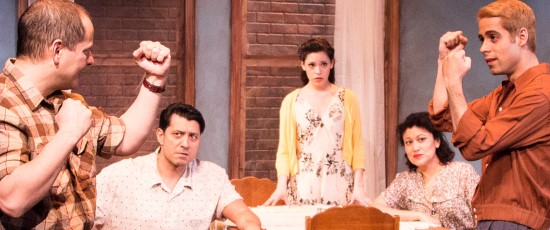 Review: “A View From the Bridge” by Arthur Miller, produced by Teatro Vista, at Victory Gardens Theatre through May 18. ★★★★★
Review: “A View From the Bridge” by Arthur Miller, produced by Teatro Vista, at Victory Gardens Theatre through May 18. ★★★★★
By Lawrence B. Johnson
Great theater does not require introduction or advocacy. It announces and proclaims itself. It is, in other words, what it is. Behold the heart-breaking, thrilling greatness of Teatro Vista’s raw-boned take on Arthur Miller’s “A View From the Bridge.”
Here is one fine ensemble of actors, thoroughly invested in their story of human frailty and melded into a believable community by the unerring hand of director Ricardo Gutierrez. It is a tale told by a compassionate observer, full of promise and pain signifying — what? Perhaps the tenuous grip of natural order, and the imperfect accord between that ideal and the darker impulses of the human soul.
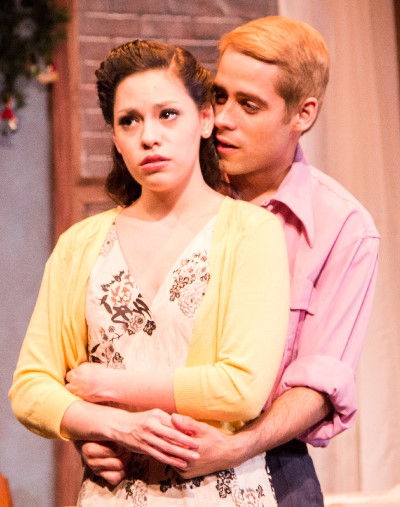 Consider the case of Eddie Carbone, a dock worker in 1950s Brooklyn. He’s a regular guy, well liked in this Italian-American enclave. He works hard for what he has, which isn’t a lot. But he has a good wife, Beatrice, and the two of them have raised her late sister’s daughter, Catherine, a pretty girl now 17 years old. Eddie has been as good as any father to her. He dotes on her. Catherine is his pet and she knows it. It’s a happy household.
Consider the case of Eddie Carbone, a dock worker in 1950s Brooklyn. He’s a regular guy, well liked in this Italian-American enclave. He works hard for what he has, which isn’t a lot. But he has a good wife, Beatrice, and the two of them have raised her late sister’s daughter, Catherine, a pretty girl now 17 years old. Eddie has been as good as any father to her. He dotes on her. Catherine is his pet and she knows it. It’s a happy household.
Mostly happy, anyway. Eddie has been a pain about letting Catherine widen her horizons, venture a bit from the nest, meet other people – maybe even go on some dates. Beatrice keeps telling him he’s being over-protective, but Eddie insists it’s a dangerous world out there and when Catherine is a little older…Well, when she’s older.
Into this little domestic tempest walk Beatrice’s cousins from the old country, middle-aged, physically imposing Marco and young, good-looking, sweet-tempered Rodolpho. They are illegal aliens, come to live secretly with Eddie and Beatrice, undetected by the immigration authorities. Marco seeks work so he can send money to his starving family in jobless Italy; Rodolfo just wants a shot at life in the land of milk and honey. But when the boy and Catherine quickly hit it off, Eddie turns churlish — then, progressively, desperate. Driven by something he cannot name, and will not acknowledge, he hammers a crisis into catastrophe, into tragedy.
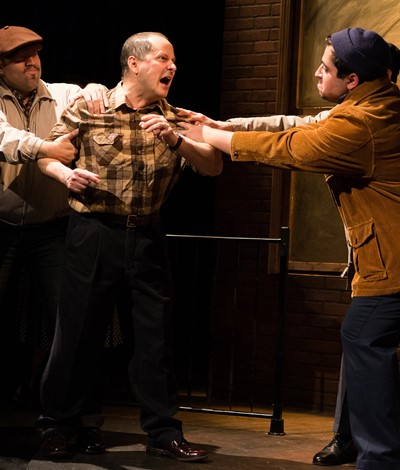 Ramón Camín’s tormented Eddie is a marvel to witness. Arthur Miller carefully sculpted the arc of Eddie’s misery-to-madness, allowing us to see him early as a malleable father-figure who can be persuaded to cave like any dad when mom and daughter team up. And Camín portrays the good guy with sly indulgence: He can cut Catherine some slack, play out a little of this string invisibly attached to his dove.
Ramón Camín’s tormented Eddie is a marvel to witness. Arthur Miller carefully sculpted the arc of Eddie’s misery-to-madness, allowing us to see him early as a malleable father-figure who can be persuaded to cave like any dad when mom and daughter team up. And Camín portrays the good guy with sly indulgence: He can cut Catherine some slack, play out a little of this string invisibly attached to his dove.
But when Camín begins that long descent, as Eddie rides his emotional collapse right over the brink of reason, the power of his conviction and the depth of his extremity hold us in rapt fascination. Camín’s paranoid-obsessive Eddie dwells on a plane just out of human reach. His wife, his companions, his lawyer all watch his disintegration but cannot make him see that he’s plunging headlong toward calamity.
As Eddie’s lawyer and counsellor, and the playwright’s story-teller, Mark Ulrich cuts an elegant image of wisdom, understanding and regret that he, like everyone else, could do nothing to prevent the awful thing that happened.
Sandra Marquez’s Beatrice strikes a credible balance between wifely duty and womanly need. She will not abandon Eddie and she makes a valiant effort to bring him to his senses, but she also sees the meaning and the intimacy draining from her marriage. It’s through Marquez’s comprehending eyes that our own sympathy for this troubled man is sustained.
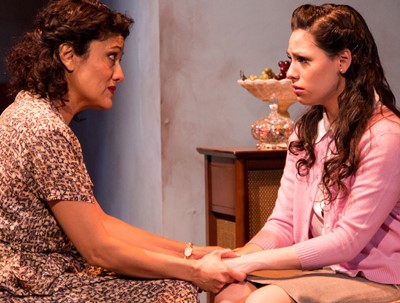 And what a lovely picture of blooming womanhood is Ayssette Muñoz’s Catherine. In one of the play’s most fraught scenes, innocent Catherine, ever attuned to Eddie’s needs, brings him a cigar, unwraps it and pops it into his mouth. Eddie’s in heaven. And you’re thinking, sometimes a cigar is not just rolled tobacco. Muñoz, eyes sparkling, plays it disarmingly straight.
And what a lovely picture of blooming womanhood is Ayssette Muñoz’s Catherine. In one of the play’s most fraught scenes, innocent Catherine, ever attuned to Eddie’s needs, brings him a cigar, unwraps it and pops it into his mouth. Eddie’s in heaven. And you’re thinking, sometimes a cigar is not just rolled tobacco. Muñoz, eyes sparkling, plays it disarmingly straight.
Which takes us to the pivotal scene of Beatrice’s heart-to-heart with Catherine on what it means to cross from girlhood to womanhood, and how it’s no longer OK to parade around in front of Eddie in a slip or sit on the edge of his bath while he shaves. Muñoz’s Catherine, at first uncomprehending but visibly discomfitted, slowly comes around as Marquez’s single-minded Beatrice drums away at this new reality. The credibility of that little chat buttresses Catherine’s later, changed stance versus the willful Eddie.
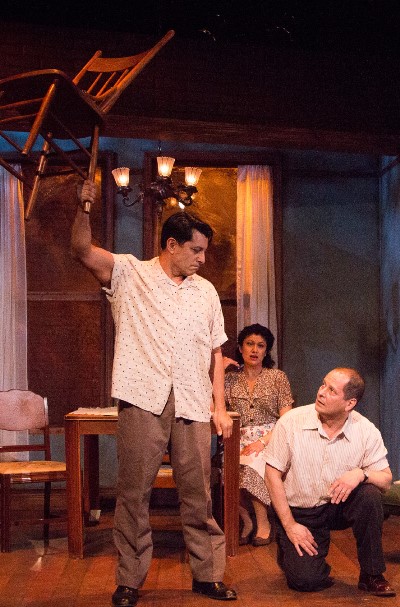 As the illegal boarders Marco and Rodopho, Eddie Diaz and Tommy Rivera-Vega make a wonderful pair of opposites, the older man soft-spoken and focused on his life-saving mission and the younger spilling over with charm, assorted talents and grand plans. Rivera-Vega and Muñoz are a natural couple as starry-eyed kids eager to marry and give the world a go.
As the illegal boarders Marco and Rodopho, Eddie Diaz and Tommy Rivera-Vega make a wonderful pair of opposites, the older man soft-spoken and focused on his life-saving mission and the younger spilling over with charm, assorted talents and grand plans. Rivera-Vega and Muñoz are a natural couple as starry-eyed kids eager to marry and give the world a go.
If Marco has less to say, Diaz lends him the eloquence of a expressive face. And in the famous “chair” scene, where Marco gives Eddie a silent but unequivocal warning about his treatment of Rodopho, Diaz’s well-muscled statement rings with daunting clarity.
The collective triumph of this production certainly extends to technical aspects from set designer Regina Garcia’s simple home and Christine Pascual’s period clothing to the dramatic enhancements of lighting designer Brian Hoehne and sound designer Christopher Kriz. Teatro Vista’s achievement, representative of the best that Chicago storefront theater can be, stands up to the finest dramatic work I’ve seen this season on any stage.
Related Link:
- Performance location, dates and times: Details at TheatreinChicago.com
Tags: A View From the Bridge, Arthur Miller, Ayssette Munoz, Brian Hoehne, Christine Pascual, Christopher Kriz, Eddie Diaz, Mark Ulrich, Ramón Camín, Regina Garcia, Ricardo Gutierrez, Sandra Marquez, Teatro Vista, Tommy Rivera-Vega

